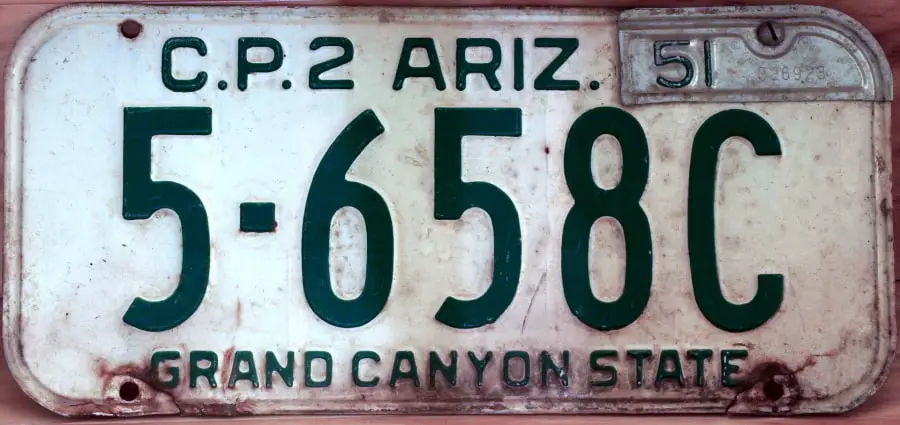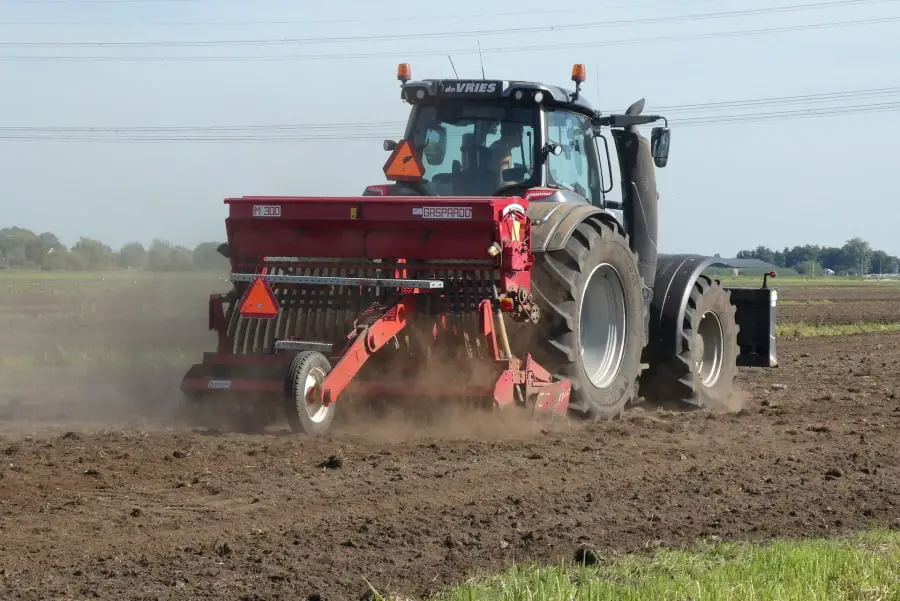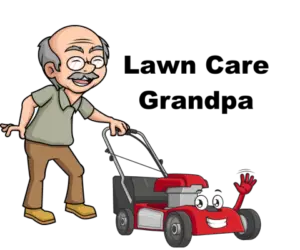Riding mowers are incredibly useful for managing large swathes of grass in relative comfort. It’s arguably the most fun one can have while doing chores. However, are there any legal hoops to jump through before you get behind the wheel of one? What about other farm equipment like tractors and farm use trucks?
No license is needed for adults to operate a riding lawn mower, tractor, or farm use truck on private property. Lawnmowers are not allowed on highways. Properly lighted tractors are, but no license is needed. Farm trucks if owner operated do not require a CDL in state and under 150 air miles.
This article focuses on the issue of driving licenses and their relation to riding mowers and farm equipment. We will examine whether these ridden mowers and tractors can be classified as “vehicles” before diving into various bits of legalese! We will also look at the stipulations surrounding licenses and the legality as it pertains to other agricultural use vehicles.

Contents
Is A Lawnmower A Motor Vehicle Under State Laws?
This question is a bit complicated because the answer varies across different states. Though the wording of ordinances and statutes are similar in many states, even those with nearly identical wording are subject to varied interpretations by current government officials and lawmakers.
In a majority of states, a lawnmower is not considered a motor vehicle because it doesn’t meet the requirements to be used on public highways. In a minority of states, the definition of motor vehicle doesn’t include this stipulation which effects how they treat laws and crimes concerning them.
Let’s start with the Merriam-Webster definition:
“A motor vehicle, also known as a motorized vehicle or automotive vehicle, is a self-propelled vehicle, commonly wheeled, that does not operate on rails and is used for the transportation of people or cargo.”
Their website gives a bit more of a condensed version.
Using the above definition, it is easy to shoehorn riding mowers into the “motor vehicle” category. However, the law may be of a slightly different perspective.
According to the late George Jones “The Possum”, a lawn tractor most definitely is a vehicle. This was at least when his wife would hide his keys and he was trying to get to the local bar.
Several states classify vehicles as one of:
- Private passenger vehicles (cars, SUVs, vans, minivans)
- Motor homes (Recreational/ overland vehicles)
- Motorcycles
- Trucks
A lot of states, including Texas, add on to the dictionary definition by declaring that a motor vehicle is “a self-propelled device designed for transporting persons or property on a public highway that is required to be registered.”
This latter definition means that riding lawn mowers are not considered as motor vehicles in states with such statutes.
Firstly, while riding mowers technically carry a “driver”, they are not necessarily made for “transporting”. Secondly, lawnmowers are not allowed on highways and urban city streets in the U.S. This is because of their (usually) low height, limited speed, and lack of safety features (turn signals, head/ tail lights, seatbelts, etc.,).
This point was emphasized by a Georgia court ruling back in 2009, where the theft of a lawnmower was reduced from a grand theft auto charge to a basic theft charge. The basis of the decision was that riding lawnmowers are specifically made for cutting grass, rather than transportation.
Is A Tractor Considered A Motor Vehicle?
In most every state there are regulations for farm use tractors detailing lighting and signage when used on public roads. These are concerned with safety around other vehicles and visibility.
Though due to individual state regulations these guidelines change from state to state in large and small ways.
What does this mean now for how tractors are considered when compared with vehicles meant for transportation? This is an important question for insurance agents looking to write policies for these farming machines.
Tractors are considered motorized vehicles when used on public highways in most states. A few states agree with Wisconsin and don’t deem them designed for public roads. A majority of states agree with Tennessee that tractors are vehicles because they can transport persons or property on a highway.
It is important to check with your state to find out how the local official designations exist as this has an impact on insurance and roadway safety laws.
What Are Farm Vehicles And Farm Exemptions?
There is another vehicle that though it is considered such, is exempt from many of the regulations and inspections required of the cars and trucks parked in most everyone else’s driveways. They are commonly referred to as Farm Trucks or Farm Vehicles.
Farm vehicles are cars, trucks, or utility vehicles that are used in the daily business of a farm and doesn’t travel over state lines or more than 150 air miles per month. They are excluded from the requirements and regulations that most other vehicles must abide by.
These do not have to be ‘street legal’ or even meet minimum safety standards in most cases. They are designed to carry farm related equipment to and from farmland and are only allowed to be driven by farm owner operators or their family members.
What are Farm Vehicles allowed to do?
They are meant for direct farm business use only and are not intended to be family or bulk delivery vehicles. They should be used more like a forklift would be on a factory floor or a golf cart on a golf course.
What are Farm Vehicles allowed to carry?
They are allowed to carry the following from or to the farm they are registered to with specific license plates.
- Farm machinery
- Farm products
- Livestock
- Farm supplies
Can You Drive A Lawnmower On The Road Without A License?
Again, this is a state-by-state issue. Generally speaking, operating a riding lawnmower on private property is just a matter of being of legal age, which is 16 in states that enforce this rule. You don’t need a driver’s license to mow your lawn.
However, it’s a different story on public roads.
Riding mowers are not considered street legal, which means they are not allowed on public roads and highways…even if you have a license. The rare exception comes in rural areas that allow them to temporarily occupy lanes, but in these instances a drivers license is required.
Some urban areas allow people to use mowers to cross the road (e.g., when going to cut your neighbor’s grass) but occupying a lane like regular traffic is not allowed for safety and registration reasons. Most mowers do not have the aforementioned safety features or registration license plates.
Areas That Allow Lawnmowers Temporarily on Roadways
Laws for farm and country roads can be a bit more lenient. Lawnmowers may be temporarily used, with a license, on minor roads unless the law explicitly states otherwise. For use on these roads, mowers, like other “farm equipment” vehicles, must be fitted with rear reflective triangles to make them visible to motorists.
Ultimately, the movement of mowers on country roads is only permissible on reasonable grounds, such as moving the mower to another field for its purpose. Aimless joyrides could still land you in hot water.
Interestingly enough, you can be charged with a DUI if you are suspected of operating your mower while intoxicated on the road. This automatically suggests that a license is required because DUIs result in the accumulation of points against it.
Also, the fact that you are not allowed to drive your mower on the road with a suspended license is further evidence of its necessity.
Can You Drive A Tractor On The Road Without A License?
If you have ever been in one of those long lines that trail behind a farm tractor of any size, then you know that this happens regularly in rural areas. But is this legal or something they are just doing anyway since they are in less populated locations?
It is legal in nearly every state to drive a farm tractor on public roads. It is also a little known fact that a drivers license is not needed in either the commercial or regular forms to use a tractor on the highway. There are exceptions in 14 states for minors who need forms of certified training.
One of the main reasons for allowing tractors on the road in the first place is the usually oversized nature and sturdy construction of most tractors. Safety of the driver is generally not a concern.
This is also true for drivers around the tractor on the road. The slow speeds that these machines reach make them easy to avoid and safe to operate around.
Slow Moving Vehicle Signage

The caveat here is the mandatory signage and lighting that tractors must display when on open roadways. Slow moving vehicle signs are triangle signage usually displayed on the back of a tractor to let other motorists know that top speeds may be well under the speed limit.
Due to their powerful design, these machines only are capable of modest top speeds. When on roadways that are much narrower than the crop fields they were made for it is difficult to meet the flow of traffic.
For this reason it is required in most every state and even by federal statutes that a “Slow Moving Vehicle Sign” be clearly visible.
Can You Drive A Farm Vehicle On The Road Without A License?
Have you ever wondered about those older looking vehicles (usually beat up pickup trucks) you see on country roads with farm use license plates? Sometimes you see even young teens driving them or older men you could swear are above 90 years old. Do they have to go by the same restrictions as other drivers?
According to the federal government CDL licenses, physical examinations, and driver qualification files are not required for farmers and their families to operate farm vehicles on public roadways. This is true if they are kept with the 150 air mile per month limit and used for farm business.
These farm vehicles are also not held to the same safety and operational standards as normal use cars and trucks. As long as the proper license plate and registration is maintained, they can be in varying states of operating order and driven by unlicensed drivers.
Is It Legal To Ride A Lawnmower On The Sidewalk?
While it is easy to assume that a cruise down the sidewalk is a harmless bit of fun, you might learn very quickly (and harshly) that sometimes, it’s better to ask.
Riding a mower on the sidewalk is prohibited in almost every state. The sidewalk (even the strip that may rest along your own property) belongs to the city/town as a whole, not individual citizens. Crossing sidewalks to get to other areas for mowing purposes is generally permitted.
While local government graciously allows people to walk along their sidewalks, they could take serious exception to unreasonable mower rides. Failure to observe this law could land you a trespassing or other charge.
For another example, it is illegal to even ride bicycles on sidewalks in some cities in the United States. Arlington, Virginia for example prohibits two and three wheeled operator powered cycles from being navigated on sidewalks within the city limits. Specific bike lanes or trails must be used.
Regulations for sidewalks and easements are enforced with varying strictness from town to town and regulations vary as well. Check with your local laws to find out the stipulations in your community.
Do You Need Insurance For A Riding Mower?
In addition to the tricky “motor vehicle” legalese, riding lawnmower owners also have to think about the small matter of insurance….and the slick-talking men and women who provide it.
There are two types of insurance that is usually necessary for a private residential riding mower:
- Property insurance
- Liability insurance
It goes without saying that tractors and other heavy machinery used for farm business (excluding farm use vehicles) will have their own requirements for insurance. Let’s focus here on the more grey area of residential lawn tractors and mowers.
Property Insurance For Riding Mowers
Property insurance covers your mower if it is damaged or stolen. In either event, you make a claim to your insurance company, which assesses the case and pays you the amount required to replace your losses.
This type of insurance also applies if you were to have a fire that destroyed your equipment or a flood damaged it if natural disasters were included or added to the policy.
If other people are on your private property and are hurt by your lawnmower, this leads us to the next type of insurance.
Liability Insurance For Lawnmowers
Liability insurance is concerned with paying out damages for something you are “responsible” for. In this context, liability insurance is there to cover the costs of damage caused by/with your mower.
If, for example, you were to accidentally injure someone while using your mower, liability insurance would help you cover the costs of medical care, lawsuits, and any other quantifiable losses.
General Home Insurance For Lawnmowers
Both forms of insurance can be an extension of your home insurance policy, which can cover items and equipment stored in outbuildings like sheds and garages. However, you need to be extremely careful with this. Make sure your provider briefs you on the full extent of your cover. Never assume anything when it comes to insurance.
Alternatively, you can get specific property insurance for your mower if you want to be extra safe. Riding mowers are on the pricey side, so some owners may not be comfortable with relying on their home policy.
Specific liability insurance is also available for private lawnmower owners who want to avoid the HO 3 minefield.
Commercial Business Insurance For Lawnmowers
If your riding mower is to be used commercially (i.e., for a landscaping business), you cannot rely on your home policy because the mower won’t necessarily be “used solely to service a residence”.
You could skirt this requirement by working on private residences, but your coverage would be compromised if you were to ever work on public property.
The advisable route for commercial landscaping businesses is to get a commercial lawn care insurance package. This is because these businesses locations needing lawn care and maintenance require commercial property and liability insurance used at a minimum.
To launch a commercial lawn care or landscaping business with your riding mower, you will need:
- Commercial property insurance: this covers the mower against damage or theft.
- General liability insurance: to protect the business from liability claims if your mower injures someone or damages property.
Other mandatory insurance coverage related to you lawnmower:
- Commercial auto insurance: cover for road-legal business vehicles such as the trucks used to haul your lawnmower.
If you have employees that are not designated as contract labor:
- Worker’s compensation insurance: this covers any injuries or health problems your employees may sustain on the job.
Optional insurance that may or may not be necessary would include:
- Cyber liability insurance: to cover your business in the event of digital customer data loss or hacks. This would apply to businesses dealing with taking payments primarily through online means (i.e. website solutions)
Regardless of whether you want to spruce up your backyard, or build a landscaping empire, your riding lawnmower(s) will need insurance of some type.
Final Touches On Is A License Needed For A Lawnmower, Tractor, or Farm Truck…
These vehicles (designated so in most cases) are designed for utility by nature and though they can be used for brief travel, it should be for the express purpose of fulfilling an immediate need associated with mowing or agricultural work.
Taking a ride to the local bar like George Jones or a scenic tour of a cities historic district is not advisable.
In most cases a license is not needed for riding lawnmowers, tractors, or farm use vehicles. Because like everything exceptions apply, check with your local ordinances before taking to the streets with your utility vehicle.
References
https://www.hotcars.com/weird-lawnmower-driving-laws/
https://www.insurancejournal.com/news/southeast/2009/11/25/105570.htm
https://www.propertyinsurancecoveragelaw.com/files/2018/09/HO-00-03-05-11-1.pdf
https://nasdonline.org/2065/section3/d001906/agricultural-equipment-on-public-roads.html
